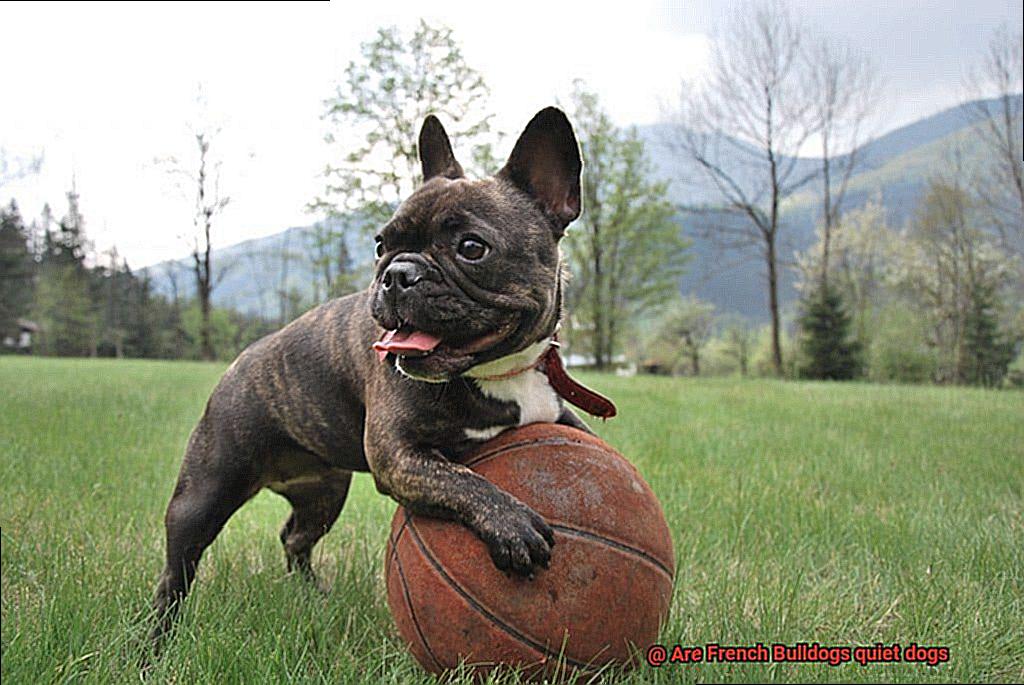Are French Bulldogs quiet dogs?
Today, we embark on a captivating quest to unravel the enigma surrounding one of the most adored and irresistible breeds in the world: French Bulldogs. These pint-sized charmers, with their unique appearance and delightful personalities, have stolen the hearts of countless pet owners across the globe. But amidst their undeniable charm, one question lingers in our minds: Are French Bulldogs truly quiet dogs?
While these lovable canines, affectionately known as “Frenchies,” may not be classified as silent breeds, they possess a mesmerizing set of qualities that make them irresistibly appealing. With their expressive eyes that could melt even the coldest heart, bat-like ears that stand tall like sentinels of cuteness, and a smushed snout that exudes charm from every wrinkle – it’s no wonder they reign supreme in the realm of adorable.
But what about their vocal tendencies? Do French Bulldogs unleash an endless stream of yaps and barks like an overzealous opera singer? Or do they keep their precious tranquility intact? Join us on this thrilling journey into the world of these delightful companions as we explore just how “quiet” French Bulldogs truly are.
Prepare to be captivated by their unique blend of characteristics that make them both casual couch potatoes and vigilant protectors of the pack. Brace yourselves for an exhilarating exploration into French Bulldogs’ vocalizations – uncovering the truth behind their penchant for silence or playful chatter.
Together, we will unmask the quiet or not-so-quiet nature of French Bulldogs, shedding light on their temperament, upbringing, and individual personalities that shape their vocal tendencies. Get ready to become a true aficionado of these endearing creatures who have stolen hearts far and wide.
So buckle up and get ready for an insightful adventure into the world of French Bulldogs. Let us embark on this journey together, as we uncover the secrets behind their vocalizations and discover why these furry companions have become beloved by so many.
The History of French Bulldogs and Their Quiet Temperament
Contents
- 1 The History of French Bulldogs and Their Quiet Temperament
- 2 Understanding French Bulldogs’ Non-Verbal Communication
- 3 Variations in Behavior Among French Bulldogs
- 4 Socialization, Training, and Stimulating Environments for French Bulldogs
- 5 Excessive Barking and Vocalization in French Bulldogs
- 6 The Role of Professional Trainers in Addressing Excessive Barking and Vocalization
- 6.1 Understanding the Underlying Reasons
- 6.2 Assessing the Environment and Lifestyle
- 6.3 Positive Reinforcement Training Techniques
- 6.4 Desensitization and Counter-Conditioning
- 6.5 Proper Socialization Techniques
- 6.6 Establishing Consistent Rules and Boundaries
- 6.7 Importance of Mental and Physical Stimulation
- 6.8 Ongoing Support and Guidance
- 7 Tips for Owners to Ensure a Quiet Temperament in Their Dog
- 8 Conclusion
French Bulldogs are adored for their charming looks and friendly demeanor. But did you know that they also have a reputation for being quiet dogs? In this article, we will explore the fascinating history of French Bulldogs and delve into what makes them so calm and quiet.
Whether you’re a proud owner or considering bringing one into your family, understanding their history and temperament will help you build a stronger bond with your furry friend.
The History of French Bulldogs:
French Bulldogs originated in 19th century England, where they were bred as miniature versions of English Bulldogs. These lovable companions accompanied lace workers who migrated to France during the Industrial Revolution. Over time, they gained popularity among the working class in France and became the cherished breed we know today.
Appearance and Characteristics:
French Bulldogs have a unique appearance with their compact bodies, square-shaped heads, and bat-like ears. Their short and smooth coats come in various colors, adding to their appeal. Beyond their looks, French Bulldogs are known for their friendly and affectionate nature, making them ideal companions.
Understanding Their Quiet Temperament:
French Bulldogs stand out among other breeds for their quiet and calm temperament. While individual personalities can vary, French Bulldogs are generally not excessive barkers. This can be attributed to their breeding history as companion dogs. They were purposefully bred to be calm and affectionate, which contributes to their overall quiet demeanor.
Reasons for Their Quietness:
Several factors contribute to the quiet nature of French Bulldogs. Firstly, their small size makes them less likely to engage in loud behaviors or territorial barking. Additionally, their easygoing nature means they are generally less prone to excessive barking triggered by anxiety or stress. These traits make them perfect for apartment living or households where noise levels need to be kept low.
Communication Style:
While French Bulldogs may not bark excessively, they still communicate with their owners through non-verbal means. They are expressive dogs that use body language, facial expressions, and vocalizations such as grunts, snorts, and sighs to convey their emotions or needs. Learning to interpret these cues will help you understand and respond to your French Bulldog effectively.

Training for Quiet Behavior:
Although French Bulldogs have a natural tendency towards being quiet, proper training is essential to reinforce this behavior. Early socialization and obedience training can help teach them appropriate behaviors and reduce the likelihood of excessive barking. Positive reinforcement techniques, such as rewarding calm behavior, are highly effective in encouraging a quiet temperament.
Understanding French Bulldogs’ Non-Verbal Communication
French Bulldogs are known for their adorable looks and charming personalities. They may not be able to speak our language, but they have a unique way of communicating through non-verbal cues.
As a French Bulldog owner, it is essential to understand these cues to build a strong bond with your furry friend and ensure their well-being.
In this guide, we will explore the various ways French Bulldogs communicate non-verbally, including facial expressions, body postures, tail wagging, and vocalizations.
Facial Expressions: The Eyes, Ears, and Mouth Say It All
French Bulldogs have expressive faces that can reveal a lot about their emotions. Wide eyes and raised ears often indicate excitement or curiosity. On the other hand, narrowed eyes and a closed mouth may suggest discomfort or fear. Paying attention to these subtle changes in their facial expressions can help you gauge their emotional state accurately.
Body Postures: The Language of the Body
Just like humans, French Bulldogs use their bodies to communicate. A relaxed and loose posture usually indicates that they are comfortable and content. However, a stiff posture with raised hackles may suggest aggression or anxiety. It’s important to observe their body language in different situations to understand how they are feeling.
Tail Wagging: Not Always a Sign of Happiness
Contrary to popular belief, tail wagging in French Bulldogs does not always mean they are happy. The position and speed of the wag can provide insights into their emotional state. A slow wag with a low tail may indicate caution or submission, while a fast wag with a high tail can indicate excitement or happiness. Be sure to consider the context and accompanying body language to interpret their tail wagging accurately.
Vocalizations: Understanding Their Unique Voices
While French Bulldogs are generally not known for being excessively vocal, they do use vocalizations to communicate. They may bark, growl, whine, or even howl to express different emotions or needs. Pay attention to the context and accompanying non-verbal cues to understand the meaning behind their vocalizations effectively.
Understanding Individual Differences: Every Frenchie is Unique
It’s important to remember that each French Bulldog is unique and may have their own individual communication style. Some may be more demonstrative with their non-verbal cues, while others may be more subtle. Spending time observing and getting to know your specific dog’s communication patterns will help you develop a deeper understanding of their needs and emotions.
By understanding and interpreting your French Bulldog’s non-verbal cues, you can better meet their needs and ensure their happiness and well-being. Remember that building a strong bond takes time and patience. Observe, listen, and respond to your Frenchie’s unique communication style, and you’ll strengthen your relationship in no time.
Variations in Behavior Among French Bulldogs
French Bulldogs are beloved companion dogs known for their calm and laid-back nature.
However, it’s important to recognize that each French Bulldog is unique, and variations in behavior can arise due to genetics, upbringing, socialization, environment, and individual personalities.
In this article, we will explore these factors in detail to help you better understand your French Bulldog’s behavior.
Genetics:
Genetics play a significant role in shaping a French Bulldog’s behavior. Different bloodlines may have distinct temperaments, so researching the lineage of a potential French Bulldog can provide valuable insights into their behavioral tendencies.
Some lines may be more active or vocal than others. However, it’s important to note that while genetics can influence behavior, it does not determine it entirely.
Upbringing and Socialization:
The early experiences of a French Bulldog significantly impact their behavior. Puppies who are exposed to various people, animals, and environments from a young age are more likely to grow up as well-adjusted and confident dogs.
Adequate socialization helps prevent fear or aggression issues later in life. Introducing your puppy to positive experiences such as different sounds, surfaces, and people will build a foundation for their future behavior.
Environment:
The environment in which a French Bulldog lives can greatly influence their behavior. Dogs thrive in calm and stable households where routines are consistent and training methods are positive and reward-based. Conversely, exposure to loud noises, chaotic environments, or inconsistent training can lead to anxiety or vocalization issues.
Individual Personalities:
Just like humans, French Bulldogs have unique personalities and preferences. Some may naturally be more reserved or quiet, while others may be outgoing or vocal. It is crucial for owners to respect their dog’s individuality and provide appropriate training and guidance that aligns with their specific needs.
Socialization, Training, and Stimulating Environments for French Bulldogs
French Bulldogs are known for their serene and easygoing nature, but like any dog, they need proper socialization, training, and a stimulating environment to thrive.
In this comprehensive guide, we will explore how to raise a well-behaved and balanced French Bulldog by focusing on these three key aspects. So let’s dive in and unlock the serene symphony of your French Bulldog’s personality.
Socialization
- Early Start: Begin socializing your French Bulldog puppy as early as possible, ideally between 3 to 14 weeks of age.
- Expose to Various People: Introduce your puppy to different types of people, including children, adults, and individuals wearing hats or glasses.
- Positive Reinforcement: Reward your puppy with treats and praise when they approach new people calmly and without fear.
- Animal Encounters: Supervised interactions with other dogs, cats, and small animals can help your French Bulldog develop appropriate social skills.
Training

- Basic Obedience: Start with basic obedience commands like sit, stay, and come.
- Positive Reinforcement: Use treats and praise to reward good behavior and motivate your French Bulldog during training sessions.
- Consistency is Key: Set clear rules and boundaries from the beginning and stick to them to establish a routine that your French Bulldog can rely on.
- Redirect Unwanted Behaviors: Use cues like “no” or “leave it” to redirect unwanted behaviors instead of resorting to harsh punishment methods.
Stimulating Environments
- Interactive Toys: Provide toys that challenge your French Bulldog’s problem-solving skills, such as treat-dispensing puzzles or Kong toys filled with peanut butter.
- Regular Play and Exercise: Engage in activities like walks, playtime at the park, or agility training to burn off excess energy and keep your French Bulldog mentally stimulated.
- Rotation of Toys: Rotate your French Bulldog’s toys regularly to keep them interested and prevent boredom.
- Calm Environment: Avoid loud noises or sudden disruptions that may startle or agitate your French Bulldog. Provide a comfortable and cozy space for them to relax.
Excessive Barking and Vocalization in French Bulldogs

French Bulldogs are adorable little furballs with big personalities.
However, one aspect of their personality that can be a challenge for owners is their tendency to bark and vocalize excessively.
In this section, we’ll explore the reasons behind this behavior and provide some tips on how to manage it.
Separation Anxiety: The Lonely Song
French Bulldogs are known for their strong attachment to their owners.
When left alone for extended periods of time, they can experience separation anxiety, which often leads to excessive barking and vocalization.
To help your furry friend feel more secure, try these strategies:
- Gradual Desensitization: Start by leaving your Frenchie alone for short periods and gradually increase the duration. This helps them understand that you will always come back.
- Calming Aids: Consider using pheromone sprays or diffusers, which release calming scents that can help reduce anxiety-related barking.
Boredom: The Call of the Wild
French Bulldogs are intelligent dogs that require mental stimulation to stay engaged. When they’re bored, they may resort to excessive barking to release pent-up energy. To combat boredom barks:
- Interactive Toys: Provide your Frenchie with puzzle toys or treat-dispensing toys that require mental effort to keep them entertained.
- Regular Exercise: Take your furry friend for daily walks or play interactive games like fetch to burn off excess energy.
Attention-Seeking Behavior: The Siren’s Call
Sometimes, French Bulldogs may use excessive barking as a way to get attention from their owners. To address attention-seeking barks:
- Ignore the Barking: It may be difficult, but try not to give in to their demands when they bark for attention. Only reward them with attention when they’re calm and quiet.
- Positive Reinforcement: Teach your Frenchie alternative behaviors, such as sitting or lying down, and reward them when they exhibit these calm behaviors instead of barking.
Professional Help: The Maestro’s Touch
In some cases, excessive barking may require professional help. A dog trainer or behaviorist can assess the underlying causes and develop a customized training plan to address the issue. Don’t hesitate to seek professional assistance if needed.
The Role of Professional Trainers in Addressing Excessive Barking and Vocalization
The Role of Professional Trainers in Addressing Excessive Barking and Vocalization in French Bulldogs
French Bulldogs are known for their big personalities and charming antics, but their excessive barking and vocalization can sometimes become a challenge for their owners. This is where professional trainers come to the rescue. With their knowledge and expertise, these trainers play a crucial role in addressing and managing this behavior in French Bulldogs.
Understanding the Underlying Reasons
Professional trainers have the ability to delve deep into the underlying reasons behind excessive barking and vocalization in French Bulldogs. Whether it’s fear, anxiety, attention-seeking, or other factors, these trainers can identify the root cause of the behavior.
Assessing the Environment and Lifestyle
Trainers can assess the dog’s environment and lifestyle to identify potential triggers for excessive barking. They can evaluate factors such as noise levels, interactions with other pets or people, and daily routines to gain a comprehensive understanding of the dog’s surroundings.
Positive Reinforcement Training Techniques
Through positive reinforcement training techniques, professional trainers can teach French Bulldogs alternative behaviors to replace excessive barking. By rewarding desired behaviors such as quiet and calmness, trainers can gradually reduce the frequency of barking.
Desensitization and Counter-Conditioning
Trainers may use methods such as desensitization and counter-conditioning to help French Bulldogs become less reactive and bark less frequently. By gradually exposing the dog to trigger sounds or situations while providing positive associations, trainers can help the dog develop a more relaxed response.
Proper Socialization Techniques
Professional trainers can provide guidance on proper socialization techniques to reduce anxiety and fear-based barking.
They can create controlled environments for the French Bulldog to interact with other dogs and people, helping them build confidence and reduce excessive vocalization.
Establishing Consistent Rules and Boundaries
Trainers work closely with the dog’s owner to establish consistent rules and boundaries, which are essential in managing excessive barking.
Clear communication and consistent expectations help the French Bulldog understand what is expected of them, reducing the need for excessive vocalization.
Importance of Mental and Physical Stimulation
Trainers educate owners on the importance of mental and physical stimulation for their French Bulldogs. Boredom can often lead to excessive vocalization, so trainers suggest various activities and toys that can keep French Bulldogs engaged and occupied, reducing the need for barking.
Ongoing Support and Guidance
Professional trainers offer ongoing support and guidance to owners to ensure long-term success in addressing excessive barking and vocalization. They are there to answer questions, provide additional training techniques, and help troubleshoot any issues that may arise.
Tips for Owners to Ensure a Quiet Temperament in Their Dog
French Bulldogs are known for their calm and well-behaved nature. However, every dog is unique, and it is important for owners to take proactive steps to ensure a quiet temperament in their furry friends. In this blog post, we will discuss some effective tips that can help owners promote a peaceful and harmonious environment for their French Bulldogs.
Early Socialization:
Early socialization is crucial in shaping a French Bulldog’s behavior and temperament. By exposing them to different people, animals, and environments from a young age, you can help them become confident and less prone to excessive barking or aggression. Consider enrolling your puppy in puppy socialization classes or arranging playdates with other well-behaved dogs. This will help them develop positive associations with new experiences and reduce the likelihood of fear-based reactions.
Positive Reinforcement Training:
Positive reinforcement training techniques are highly effective in promoting a quiet temperament in French Bulldogs. Use treats, praise, and rewards to encourage desired behaviors and discourage excessive barking. Consistency is key – be patient and reinforce good behavior consistently. Avoid punishment-based methods, as they can create fear or anxiety in your dog and lead to more noise-related issues.
Mental Stimulation:
French Bulldogs are intelligent dogs that require mental stimulation to prevent boredom and excessive barking. Engage your dog in interactive games, puzzle toys, and training sessions to keep their minds occupied. This will prevent them from seeking attention through constant barking and channel their energy into productive activities.
Establish a Routine:
Dogs thrive on routine and structure. Establishing a consistent daily routine for your French Bulldog can help reduce anxiety and promote a calm temperament. Regular feeding times, exercise routines, and designated rest periods provide a sense of security and stability for your dog. Stick to the routine as closely as possible to create a predictable and peaceful environment.
Manage Separation Anxiety:
Separation anxiety is a common issue in French Bulldogs, which can lead to excessive barking when left alone. Gradually acclimate your dog to being alone by starting with short periods of separation and gradually increasing the duration over time. Provide them with interactive toys or leave a radio or TV playing to provide background noise that can help soothe their anxiety.
Proper Exercise:
Regular physical exercise is essential for maintaining a balanced temperament in French Bulldogs. Take your dog for daily walks, engage in play sessions, or provide opportunities for them to run and explore in a secure area. Adequate exercise helps burn off excess energy, reduces restlessness, and promotes relaxation.
Conclusion
In conclusion, French Bulldogs are known for their quiet nature.
They are not typically prone to excessive barking or loud vocalizations. Unlike some other breeds, French Bulldogs tend to be calm and composed, making them a great choice for individuals who prefer a quieter living environment.
If you’re seeking a companion that won’t disturb the tranquility of your home, a French Bulldog might be the perfect fit.




